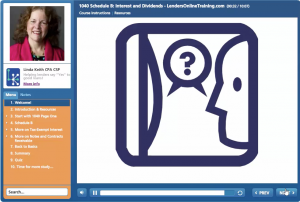Jake asks:
If a partner in a company makes a personal loan to the company and receives interest when repaid on that loan (on 1040 Schedule B), is that cash flow? I understand that interest income that the entity receives and passes through to the partner is not cash flow (the owner is just taxed on the income). I am just wondering about actual loans.
Linda says:
If what you are seeing on a 1040 Schedule B is interest received from a company, rather than pass-through, then it is actual cash flow. How can you tell? Well, you cannot always tell by looking.
Check the K-1
If you have a K-1 from the entity, you can easily trace the pass-through right back to the K-1. If the figure for interest income on the K-1 is the same as on the 1040 Schedule B, it is pass-through. Of course, that brings up other questions like what % does the owner/guarantor own of that entity? Is the K-1 entity obligated on the loan? Do I just need the K-1 or the full 1065 or 1120S? Those are great questions for another blog post.
Not on the K-1?
In that case, I would get information and documentation on the receivable. If it is continuing long enough (based on the information in the contract), I would give the borrower credit for the full payments received, not just the interest income. On my Excel Worksheet, I have a line for ‘Full Note Payments Rec’d’, right below the line for bank and credit union interest.
How long is long enough?
Long enough varies. Three or more years is typical for mortgage lenders. For business and aglenders, the life of the loan makes sense.
For consumer and mortgage lenders, if you do not need the additional income to qualify, consider just making a note so if you need it later, you don’t forget it. I generally write ‘If more qualifying income is needed, consider note receivable from Jane Doe’. You may be able to do less work and still qualify the borrower. But if you need it, you won’t forget it.
Check the Form 6252
If there is an Installment Sale Form attached, check line 21 to see how much principal was received. This is not a substitute for obtaining a copy of the contract but can give you an idea of how much you could potentially add to cash flow if it is continuing. The Form 6252 is not required for loans receivable, or for notes receivable when the item sold was sold at a loss.
Help online at www.LendersOnlineTraining.com
Click here to go to the Schedule B Module.
Or for the entire course and module list on Tax Return and Financial Statement Analysis, including 35 modules, three case studies and seven live webinars, click here.

